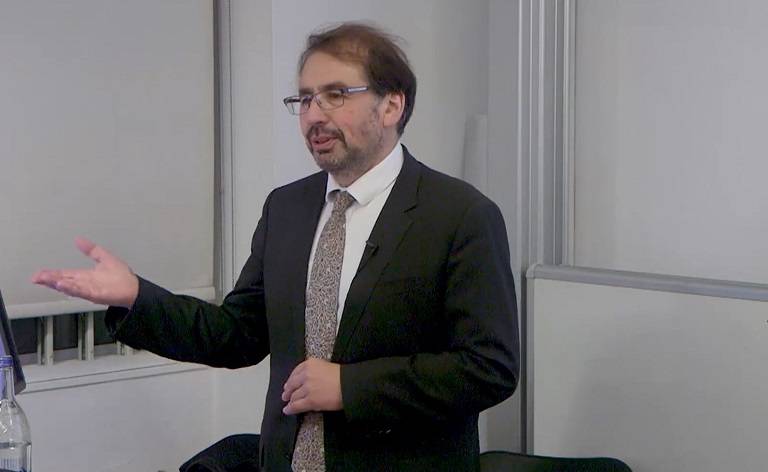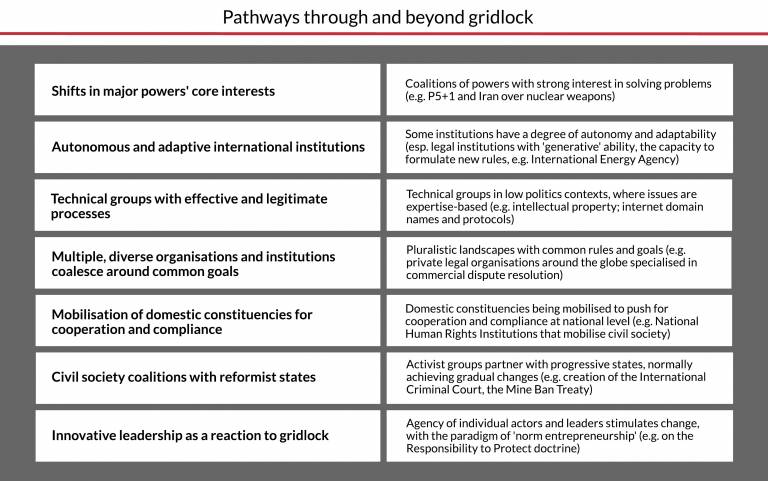Moving Through and Beyond Multilateral Gridlock
21 November 2017
Tommaso Bernabo (MSc Global Governance and Ethics) on a GGI keynote lecture with Professor David Held.

Global cooperation is failing us right when we need it the most. Or so David Held, Professor of Politics and International Relations at Durham University, argued in his 2013 book Gridlock (co-authored by Thomas Hale and Kevin Young). The emergence of more complex problems, the increase in the number of states who have the power to play a role at the global level (think of the BRICS), the inability of international institutions to act, and a generally fragmented transnational landscape have 'gridlocked' the global political system. On top of that, the inability of international institutions to solve the global challenges of our time has created a self-reinforcing vicious circle: unmanaged globalisation has contributed to the rise of populist-nationalist movements, which in turn has reduced the scope for international cooperation and worsened the governance paralysis, leading to a disrupting spiral of unmet global challenges and populism.
If this was the end of the story, we could all just 'pack up and go', as Held remarked. Fortunately, however, in Beyond Gridlock (Wiley: 2017), he - together with Hale - offers a number of reasons to maintain some hope. In collaboration with a range of experts in fields such as human rights, climate change, internet governance, and plenty more, Hale and Held set out to elaborate an analytical framework in order to conceptualise how change happens at the global level. By looking at very different policy areas, they developed a comparative theory of change, identifying seven pathways that can take us through and possibly beyond multilateral gridlock:

Some of these pathways are mutually reinforcing, whereas others may be in conflict with each other, depending on issue area and context. The essential point Held highlighted, however, is that change at the global level can - and does - happen in a variety of ways. The 2015 Paris Agreement, for example, is paradigmatic of a new way of thinking about global politics: states' individual commitments to mitigate and adapt to climate change offer the starting point for domestic actors to make sure governments are held accountable and push towards more ambitious goals and targets over time. Quite differently, the World Trade Organisation (WTO) dispute settlement mechanism, in spite of the failure of the Doha Development Round, maintains its authority and centrality, since it has the ability to generate new rules in order to adapt to new issues the WTO is faced with.
Change, thus, is not just possible but already constantly happening at the global level. Does this then mean, as someone from the audience asked, that the seven pathways have the potential to truly take us beyond gridlock and to radically transform the global governance system (e.g. by reforming the United Nations Security Council)? Hardly so. As Held himself readily admitted, change at the global level is gradual and slow. The pathways Held and Hale highlight can make a positive difference, but they do so through incremental progress. Meanwhile, the self-reinforcing circle of gridlock and populism gains strength, and the consequences are dramatically shaping our future. Relying on gradual change may ultimately be insufficient, fatally exposing Western democracies to an anti-global, authoritarian backlash. The main issue I see with Held and Hale's analysis, then, is exactly the impossibility of working through the pathways in order to generate the change that is necessary to ensure the survival of liberal democracies. If we are to meet the global challenges of our time, we cannot simply hope that incremental improvements will suffice, but need instead to advocate for a truly transformative framework that can reform the global governance system profoundly.
 Close
Close


